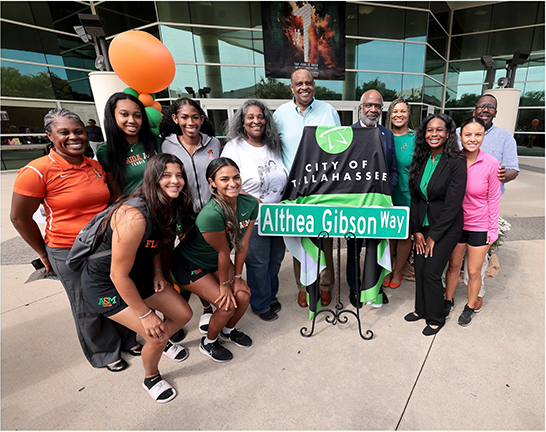Florida A&M University (FAMU) administrators, students, and staff joined City of Tallahassee and Leon County officials to unveil new signage for Althea Gibson Way.
During the April 30 ceremony in front of the Al Lawson Multipurpose Center on what was once Wahnish Way, moderator Rebecca Gaines, the No. 1 player on the FAMU Women’s Tennis Team, praised Gibon’s achievements as a trailblazing African American tennis professional who won some of her sport’s biggest titles in the 1950s and breaking racial barriers as a professional golfer.
“It is an honor to follow her. Having the opportunity to practice and play on the Althea Gibson Tennis Courts facility every day inspires me to work hard on and off the court. Her determination and success opened doors around the world for other people. I hope that seeing her name each day on Althea Gibson Way will continue to inspire everyone to work toward their dreams,” Gaines said. “Florida A&M University Women’s Tennis Team cannot be prouder of this monumental event of renaming Wahnish Way to Althea Gibson Way. It is a long time coming. The entire world can truly see how magnificent Miss Gibson was on and off the tennis court.”
Gibson was recruited to FAMU in 1949 on an athletic scholarship by iconic Coach Jake Gaither. She majored in physical education, played basketball and tennis, and was mentored in golf by Coach Hansel Tookes. Gibson was initiated into the Beta Alpha Chapter of Alpha Kappa Alpha Sorority Inc., before graduating from FAMU in 1953.
Three years later, she became the first African American tennis player to win the French Open. She was ranked No. 1 in the world in tennis in 1957. That same year and in 1958, she won both Wimbledon and U.S. Open singles championships. She was twice-voted “Female Athlete of the Year” by the Associated Press. Gibson won 56 singles and doubles championships before retiring from amateur tennis in 1959. She paved the way for other greats, like Arthur Ashe, Zina Garrison, Venus Williams and Serena Williams.
A granite statue honoring Gibson greets visitors outside the Arthur Ashe Stadium, home of the U.S. Open, at the USTA Billie Jean King National Tennis Center, in New York. After she retired from tennis, Gibson became the first Black member of the Ladies Professional Golf Association (LPGA).
President Larry Robinson, Ph.D., paid tribute to Gibson’s impressive legacy and incredible journey.
“We are gathered here today to celebrate a momentous occasion, the naming of Althea Gibson Way in honor of a woman whose legacy transcends the boundaries of sports and reflects the very essence of resilience, courage and groundbreaking achievement,” Robinson told the gathering. “Althea Gibson was not just a phenomenal athlete; she was a trailblazer who broke the color barrier in international tennis, becoming the first African American to win a Grand Slam title. Her remarkable journey, from her humble beginnings on the segregated courts of Harlem, New York, to the “highest of seven hills” at FAMU, to the hollowed grounds of Wimbledon, Roland Garros, and in the U.S. National Championship is a testament to her indomitable spirit and unwavering dedication.”
The event was emotional for Michelle Curry, administrator of the Althea Gibson Estate. Her aunt Francis Clayton Gray was the primary caregiver for Gibson during her later years.
“I’m overwhelmed; I’m overjoyed to represent Althea Gibson every second of my life,” Curry said. “One month almost to the day that Dr. Robinson joined us at the U.S. Open to dedicate Gibson’s statue, my aunt passed away because her job was done. Althea had a statue, one of two at the U.S. Open. She also has a U.S. postage stamp. In January 2025, Althea Gibson will be featured on the United States quarter,” Curry told the gathering. “So I can say, thank you; thank you; thank you; but this is not about me; it is about the work, the time, the blood, the sweat and the tears, literally, that Althea lived for the majority of her life. Every time you need a visual of what it looks like to survive, see Althea. Every time you need a visual to understand that if you can dream it you can achieve it, look at Althea. And every time you need that voice in the back of your head to tell you that you can keep going, there is Althea.”
The ceremony also featured remarks from former Congressman Al Lawson, who lobbied for the street name change, as well as Tallahassee Mayor John Dailey was joined by Commissioners Curtis Richardson, Dianne Williams-Cox, and Jack Porter, who voted for the change.
“By honoring her in this way, it is our intent to make her legacy and contributions to both athletics and civil rights even more prominent within our community and help introduce future generations to her groundbreaking achievements,” Dailey said.




